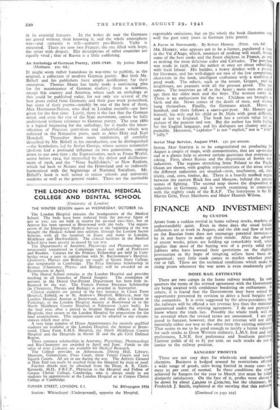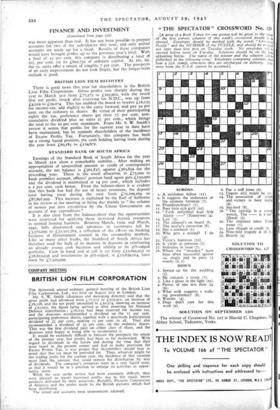FINANCE AND INVESTMENT
By CUSTOS
APART from a sudden revival in home railway stocks, markets are understandably quiet. Even in these days the usual holiday influences are at work in August, and the ebb and flow of battle on the Russian front does not encourage potential investors to be in any hurry to make up their minds. After the advance of recent weeks, prices are holding up remarkably well, which implies that most of the buying was of a pretty solid type Jobbers who have lowered their quotations on the slightest provocation in the hope of tempting sellers have been dis• appointed: very little stock comes to market whether prices rise or fall These are the technical conditions which make for rising prices whenever the war news is even moderately good
HOME RAIL ESTIMATES
There are two camps in the home railway market. In sane quarters the terms of the revised agreement with the Government are being awaited with confidence bordering on enthusiasm. In others, it is feared that the Government may have seized the opportunity presented by revision to drive a hard bargain with the companies. It is even suggested by the ultra-pessimists thi the. railways will be offered a net revenue less than the minimun guaranteed under the existing agreement. I do not pretend to know where the truth lies. Possibly the whole truth will nci be revealed when the revised terms are announced. I am re' pared to forecast, however, that the net revenue will not diffo materially either one way or the other from the existing minimum That seems to me to be good enough to justify a better valuatui for such stocks as Great Western ordinary, L.M.S. first and 194 preferences, L.N.E. first preference and Southern preferrei Current yields of 6+ to 8+ per cent. on such stocks do not justice to the railway position.
SANGERS' PROFITS
These are not easy days for wholesale and manufacturil chemists. Business is hedged around by restrictions affecng a wide range of goods, sales being limited in many cases to mere 25 per cent. of normal. In these conditions the res achieved by Sangers for the year to March 31st must be jud distinctly satisfactory. On the face of it, profits were shown be down by about £4o,00o to 4209,700, but the chairman, Frederick J. Smith, explained at the meeting that this reduc (Continued cn rage 222)
FINANCE AND INVESTMENT
(Continued from page 220) was more apparent than real. It has not been possible to prepare accounts for two of the subsidiaries this year, and only partial accounts are made up for a third. Results of these companies would have brought profits up to the previous year'ss level. With a final of 15 per cent. this company is distributing' a total cif 22k per cent. on its £602,750 of ordinary capital. At i6s. 6d. the 5s. units offer a return of roughly 7 per cent. The prospects of an early improvement do not look bright, but the longer-term outlook is good.
BRITISH LION FILM RECOVERY
There is good news this year for shareholders in the British Lion Film Corporation. Gross profits rose sharply during the year to March 31st from £77,373 to £105,902, with the result that net profit, struck after reserving for N.D.C., was up from £4,019 to £29,074. This has enabled the board to reserve £16,135 for income-tax, add slightly to the carry forward, and pay so per cent. on the ordinary is. shares. By virtue of their participating rights the ros. preference shares get their 7k per cent. non- cumulative dividend plus an extra 2k per cent., which brings the total to the to per cent. maximum. From Mr. S. W. Smith's review it seems that profits for the current year to date have been maintained, but he reminds shareholders of the incidence of Excess Profits Tax. Fortunately, this company has built up a strong liquid position, the cash holding having risen during the year from £60,185 to £124,672.
STANDARD BANK OF SOUTH AFRICA
Earnings of the Standard Bank of South Africa for the year to March 31st show a remarkable stability.. After making an appropriation of unspecified amount to credit of contingencies account, the net balance is £561,837, against £563,859 for the preceding year. There is the usual allocation to £75,000 to bank premises account, officers' pension fund again gets £r5o,000 and the dividend is maintained at 14 per cent., which includes a 2 per cent. cash bonus. From the balance-sheet it is evident that this bank has had the use of larger resources, the deposit total having risen during the year from £70,299,164 to £87,897,000. This increase is explained by the Earl of Selbome
in his review at the meeting as being mainly to " the volume of money put into circulation by the Union Government on account of war exoenditure."
It is also clear from the balance-sheet that the opportunities were restricted for applying - these increased deposit resources in normal loaning business. Between March, 194o, and March, 1941, bills discounted and advances to customers fell by £3,570,000 to £33,311.263, a reflection of the effects on banking business of Government control in the commodity markets. Like so many other banks, the Standard of South Africa has therefore used the bulk of its increase in deposits in reinforcing an already strong cash business and adding to its gilt-edged portfolio. Cash in hand and at call is up from £15,695,252 to £28,810,036 and investments in gilt-edged, at £23,639,014, have risen by £7,32o,000.



































 Previous page
Previous page